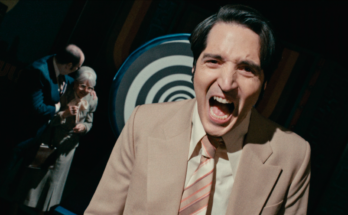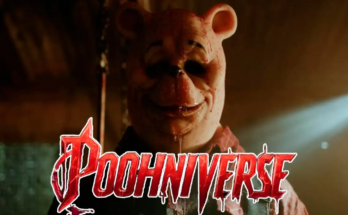Want to hear more from the actors and creators of your favorite shows and films? Subscribe to The Cinema Spot on YouTube for all of our upcoming interviews!
Managing editor & film and television critic with a Bachelor's of Arts in English Literature with a Writing Minor from the University of Guam. Currently in graduate school completing a Master's in English Literature.
The world is not in a good position at the moment in terms of wars, governments, resources, the environment, and people around us. We will always have heated discussions on specific topics whether it be “pineapples on pizza” or Marvel versus DC. In November, talk show host Bill Maher made a statement on Stan Lee’s death. Earlier this weekend, he clarified on what he said, but he does not make this any better. (You can see his video here.) You probably have friends, family, or others in your local area or vicinity who speak on the way you live, the way you dress, and the forms of mediums (television, films, books, etc.) that you follow. In this article, I address his statements and make counters.
TRIGGER WARNING: The following content on this article will hit home for some people as the writer speaks of death and forms of persons who take part in the geek culture.
In the video, Maher does not defame the late Stanley Martin Lieber but instead aims at the deceased’s followers with disparaging remarks. The host takes shots at Kevin Smith, a very popular figure in the geek community, by describing him as a “grown [man] who still dress[es] like kids.” He makes some points in his video, I shall admit, but allow me to retort.
Maher expresses his “dismay at people who think comic books are literature and [that] superhero movies are great cinema and who, in general, are stuck in an everlasting childhood.” Here are my counterpoints to this statement:
- Comic books are literature, but there are too many illustrations than spoken dialogue perhaps that it may not be deemed as such. Literature, as defined by Britannica’s website, is described as “a body of works … distinguished by the intentions of their authors and the perceived aesthetic excellence of their execution.” As I have mentioned in previous articles, the X-Men team was created to symbolize the American segregation between those of African descent and those who are Caucasians by conveying the myriad disparities between Mutants and Human Beings. Charles Xavier and Magneto were made as a reflection of Martin Luther King Jr. and Malcolm Little. In addition, the Merriam-Webster site describes literature as “written works (such as poems, plays, and novels) considered to be very good and to have lasting importance.” Maher references James Baldwin, Toni Morrison, and Michael Eric Dyson if wanting to learn about “social justice and racial tolerance.” The first comic book issue to feature Superman, Action Comics #1, was published on April 18th, 1938, long before any one of these figures could have reached the high school level and over a year before World War II could even start. The comic book culture had been around for over eight decades, maybe more, and has made history, and yet you will not see these in history textbooks.
- Maher implies that film adaptations are not “great cinema.” He is true; they are not, but no adaptation of any novel, piece of poetry, or comic book is ever faithful to its source material. Not all characters in the superhero films are in pursuit of a “glowy thing.” The talk host does not seem to take films such as Batman Returns, Logan, Kick-Ass, Wanted, (the list goes on) into consideration. He only references films set in the Marvel or DC cinematic universes.
- Lastly, Maher implies that the geek population is filled with people who have childish personalities. I know of persons with secure jobs, who attend classes and courses at the university and are highly respected by peers and professors alike. Not every geek fits the geek stereotype, and with that, I introduce the elephant in the room.
The Spectrum
As early as I can remember until now, I have met many individuals from and of the geek community who now run businesses, hold steady relations with others, and are profoundly revered by others. Yet, we are still perceived as less. Now, I do not like having to repeat the word ‘geek,’ so let’s bring into discussion the other types of geeks. There are those who like one or more of the following:
- Video games – Recently, God of War, Red Dead Redemption 2, and (yes) Spider-Man were released. The three are highly praised in this section of the community for their graphics, character development, and more so their story and plot. Maher makes a poor decision in making Fortnite as his prime example for his little thesis statement.
- Films, television, popular culture, etc.
Other types of geeks not mentioned in detail are as follows:
- Music
- Internet
- Food
- Sport
- Fashion
There are numbers of people who love video games and popular culture that attend conventions where other people dress up as characters from those mediums. Yes, they exist, but that does not mean all geeks of the so-called community are this way.
People can indulge in cartoons and comic books, and others can enjoy anime and manga. Yes, there are those of weird or unusual nature out there, but a lot of people can learn to grow up while never having grown out of this stage at all. You can mature and still like certain things.
Coping Mechanisms
People participate in the community to deal with bullying or the death of a loved one. Peter Parker and Miles Morales are two of the best examples for this. After the death of Gwen Stacy at the hands of Norman Osborn, Peter learned to eventually move on and live in her name. Earlier on his career, he learned to stand up to Flash Thompson and not against him. Similarly, after the death of Peter Parker, Miles Morales did the same as a hero.
Mediums such as music, film, television, video games, and comic books are what take us away from the harsh realities that we face every day. Everyone has lost someone or something that has been taken from us. We all deal with matters differently. We hold different ideologies and beliefs than others. You bring in religion and politics, and the whole world goes into chaos.
If we can just let people be while still under some degree of limitations, they would not have let go of their aspirations and desires. As I observe my own life and those of others around me, it pains me that not all of us will grow up to have children, let alone see what the future holds for us.
Conclusion
In his book, “Thomas Pynchon and the Dark Passages of History,” humanities professor David Cowart says the following:
One can often judge literary art by the accuracy with which it registers and gauges its cultural movement. But artists must also be the antennae of the race, to paraphrase Ezra Pound, and we therefore expect not only a scrupulous rendering of the moment from them but also some intimation of where that moment might lead and what it might come to mean over time. One expect of literature, in other words, that it reflect on the present in ways that will prove more or less prescient. Somewhat surprisingly, this prophetic dimension is precisely what informs irreal, metafictional, postmodernist fiction.
The term ‘geek’ is a whole spectrum, and it is not safe to presume that all people associated with this live “in their parents’ basements.” Where I live, not much of us have basements under our homes, to begin with. I am sure a lot of us would love to move away from our homes and live independently. The way we treat others has consequences, so take a lot of precaution of your actions.
What are your thoughts on Maher’s sentiments? Let us know! For more geek-related news and reviews, follow Geek Motivation on Twitter (@GeekMotivation) and Instagram (@geekmotivation).
Written by: John Daniel Tangalin
Sources: Britannica and Merriam-Webster
Managing editor & film and television critic with a Bachelor's of Arts in English Literature with a Writing Minor from the University of Guam. Currently in graduate school completing a Master's in English Literature.







